Business Law Report: Analysis of the UK Legal System on Businesses
VerifiedAdded on 2023/01/18
|17
|5668
|97
Report
AI Summary
This report provides a comprehensive overview of business law within the context of the UK legal system. It begins with an introduction to business law, defining its role and significance. The report then delves into the nature of the legal system, explaining its structure, sources of law (including legislation, EU law, and common law), and the role of the government in law formation. It explores the differences between civil and criminal law, and examines key legislation, regulations, and standards such as the Data Protection Act 2018, Equality Act 2010, and Enterprise Act 2002. The report also discusses the potential implications of these laws on businesses, covering aspects like recruitment, employee relations, and consumer protection. Finally, it outlines the procedures involved in the passage of a bill in the House of Commons and the implications of Brexit on the UK's legal and economic landscape, concluding with a discussion on legal solutions to business problems.
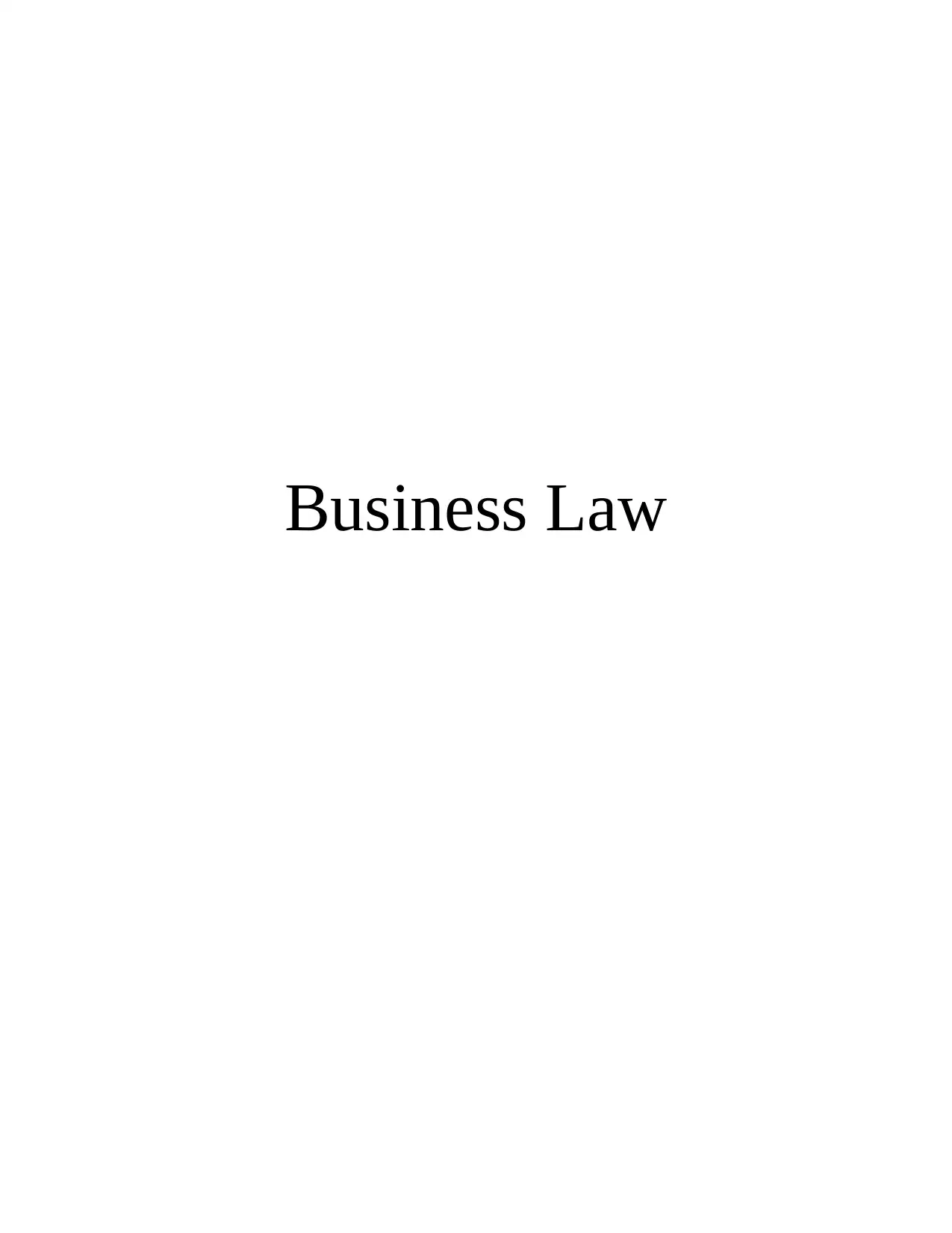
Business Law
Paraphrase This Document
Need a fresh take? Get an instant paraphrase of this document with our AI Paraphraser
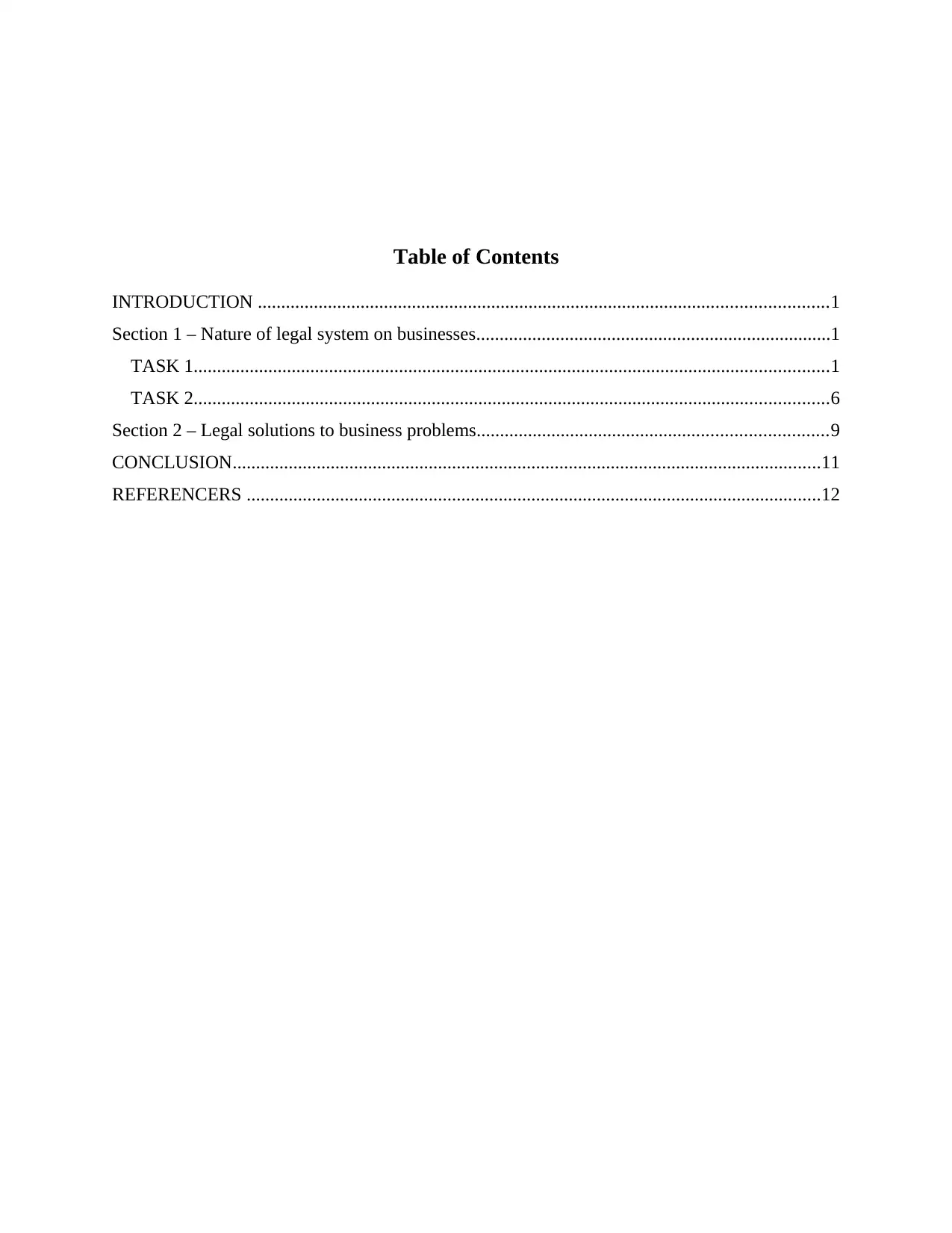
Table of Contents
INTRODUCTION ..........................................................................................................................1
Section 1 – Nature of legal system on businesses............................................................................1
TASK 1........................................................................................................................................1
TASK 2........................................................................................................................................6
Section 2 – Legal solutions to business problems...........................................................................9
CONCLUSION..............................................................................................................................11
REFERENCERS ...........................................................................................................................12
INTRODUCTION ..........................................................................................................................1
Section 1 – Nature of legal system on businesses............................................................................1
TASK 1........................................................................................................................................1
TASK 2........................................................................................................................................6
Section 2 – Legal solutions to business problems...........................................................................9
CONCLUSION..............................................................................................................................11
REFERENCERS ...........................................................................................................................12
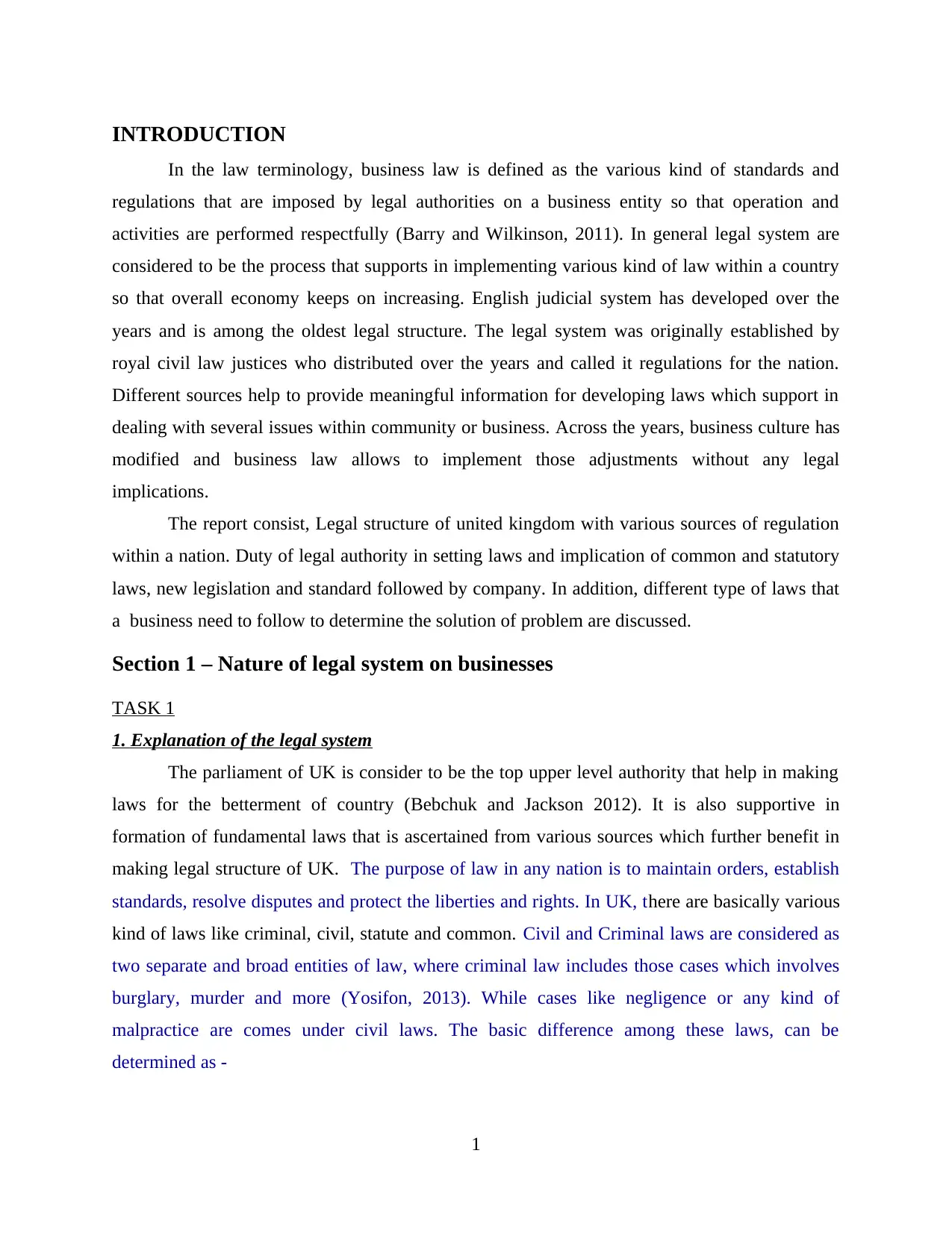
INTRODUCTION
In the law terminology, business law is defined as the various kind of standards and
regulations that are imposed by legal authorities on a business entity so that operation and
activities are performed respectfully (Barry and Wilkinson, 2011). In general legal system are
considered to be the process that supports in implementing various kind of law within a country
so that overall economy keeps on increasing. English judicial system has developed over the
years and is among the oldest legal structure. The legal system was originally established by
royal civil law justices who distributed over the years and called it regulations for the nation.
Different sources help to provide meaningful information for developing laws which support in
dealing with several issues within community or business. Across the years, business culture has
modified and business law allows to implement those adjustments without any legal
implications.
The report consist, Legal structure of united kingdom with various sources of regulation
within a nation. Duty of legal authority in setting laws and implication of common and statutory
laws, new legislation and standard followed by company. In addition, different type of laws that
a business need to follow to determine the solution of problem are discussed.
Section 1 – Nature of legal system on businesses
TASK 1
1. Explanation of the legal system
The parliament of UK is consider to be the top upper level authority that help in making
laws for the betterment of country (Bebchuk and Jackson 2012). It is also supportive in
formation of fundamental laws that is ascertained from various sources which further benefit in
making legal structure of UK. The purpose of law in any nation is to maintain orders, establish
standards, resolve disputes and protect the liberties and rights. In UK, there are basically various
kind of laws like criminal, civil, statute and common. Civil and Criminal laws are considered as
two separate and broad entities of law, where criminal law includes those cases which involves
burglary, murder and more (Yosifon, 2013). While cases like negligence or any kind of
malpractice are comes under civil laws. The basic difference among these laws, can be
determined as -
1
In the law terminology, business law is defined as the various kind of standards and
regulations that are imposed by legal authorities on a business entity so that operation and
activities are performed respectfully (Barry and Wilkinson, 2011). In general legal system are
considered to be the process that supports in implementing various kind of law within a country
so that overall economy keeps on increasing. English judicial system has developed over the
years and is among the oldest legal structure. The legal system was originally established by
royal civil law justices who distributed over the years and called it regulations for the nation.
Different sources help to provide meaningful information for developing laws which support in
dealing with several issues within community or business. Across the years, business culture has
modified and business law allows to implement those adjustments without any legal
implications.
The report consist, Legal structure of united kingdom with various sources of regulation
within a nation. Duty of legal authority in setting laws and implication of common and statutory
laws, new legislation and standard followed by company. In addition, different type of laws that
a business need to follow to determine the solution of problem are discussed.
Section 1 – Nature of legal system on businesses
TASK 1
1. Explanation of the legal system
The parliament of UK is consider to be the top upper level authority that help in making
laws for the betterment of country (Bebchuk and Jackson 2012). It is also supportive in
formation of fundamental laws that is ascertained from various sources which further benefit in
making legal structure of UK. The purpose of law in any nation is to maintain orders, establish
standards, resolve disputes and protect the liberties and rights. In UK, there are basically various
kind of laws like criminal, civil, statute and common. Civil and Criminal laws are considered as
two separate and broad entities of law, where criminal law includes those cases which involves
burglary, murder and more (Yosifon, 2013). While cases like negligence or any kind of
malpractice are comes under civil laws. The basic difference among these laws, can be
determined as -
1
⊘ This is a preview!⊘
Do you want full access?
Subscribe today to unlock all pages.

Trusted by 1+ million students worldwide
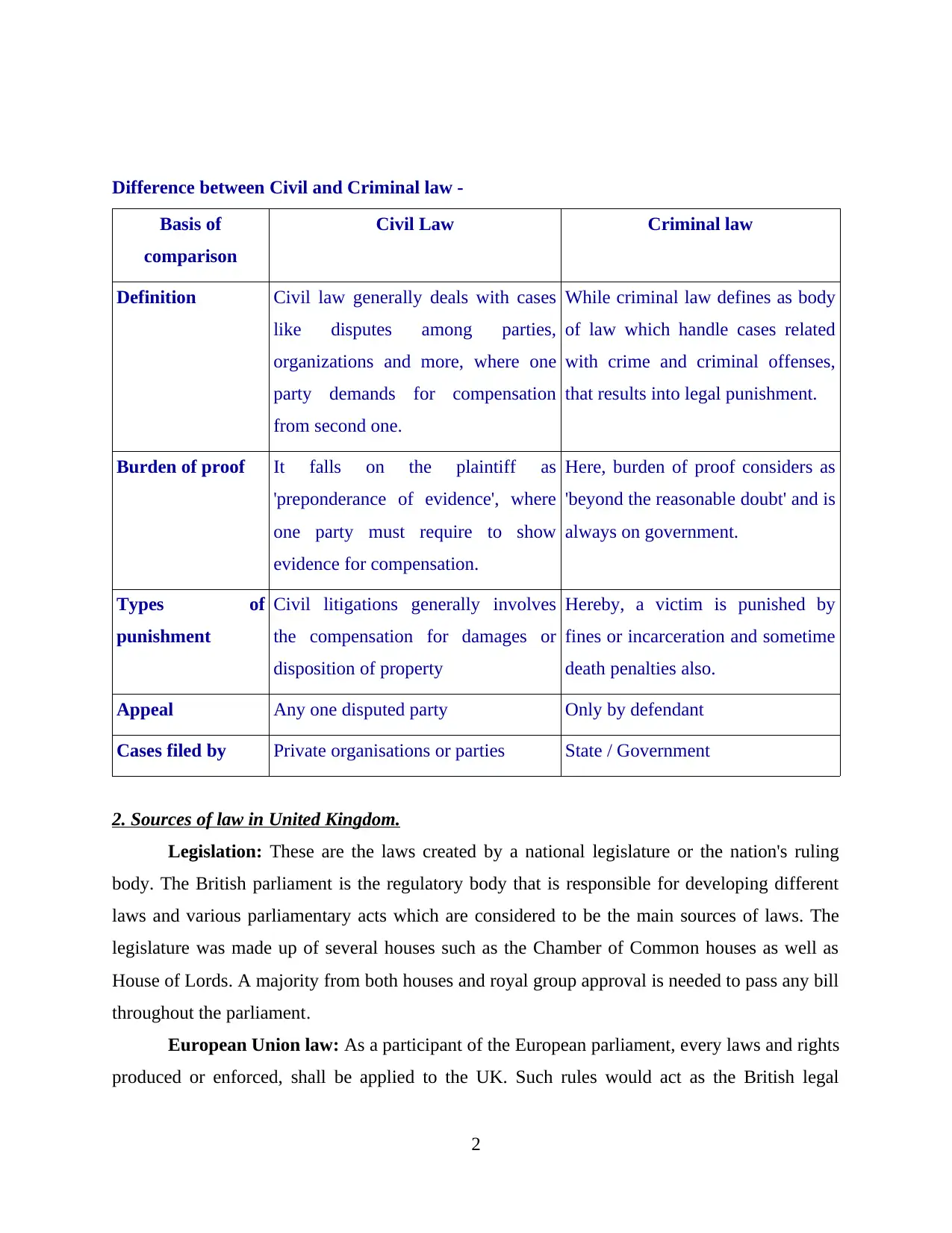
Difference between Civil and Criminal law -
Basis of
comparison
Civil Law Criminal law
Definition Civil law generally deals with cases
like disputes among parties,
organizations and more, where one
party demands for compensation
from second one.
While criminal law defines as body
of law which handle cases related
with crime and criminal offenses,
that results into legal punishment.
Burden of proof It falls on the plaintiff as
'preponderance of evidence', where
one party must require to show
evidence for compensation.
Here, burden of proof considers as
'beyond the reasonable doubt' and is
always on government.
Types of
punishment
Civil litigations generally involves
the compensation for damages or
disposition of property
Hereby, a victim is punished by
fines or incarceration and sometime
death penalties also.
Appeal Any one disputed party Only by defendant
Cases filed by Private organisations or parties State / Government
2. Sources of law in United Kingdom.
Legislation: These are the laws created by a national legislature or the nation's ruling
body. The British parliament is the regulatory body that is responsible for developing different
laws and various parliamentary acts which are considered to be the main sources of laws. The
legislature was made up of several houses such as the Chamber of Common houses as well as
House of Lords. A majority from both houses and royal group approval is needed to pass any bill
throughout the parliament.
European Union law: As a participant of the European parliament, every laws and rights
produced or enforced, shall be applied to the UK. Such rules would act as the British legal
2
Basis of
comparison
Civil Law Criminal law
Definition Civil law generally deals with cases
like disputes among parties,
organizations and more, where one
party demands for compensation
from second one.
While criminal law defines as body
of law which handle cases related
with crime and criminal offenses,
that results into legal punishment.
Burden of proof It falls on the plaintiff as
'preponderance of evidence', where
one party must require to show
evidence for compensation.
Here, burden of proof considers as
'beyond the reasonable doubt' and is
always on government.
Types of
punishment
Civil litigations generally involves
the compensation for damages or
disposition of property
Hereby, a victim is punished by
fines or incarceration and sometime
death penalties also.
Appeal Any one disputed party Only by defendant
Cases filed by Private organisations or parties State / Government
2. Sources of law in United Kingdom.
Legislation: These are the laws created by a national legislature or the nation's ruling
body. The British parliament is the regulatory body that is responsible for developing different
laws and various parliamentary acts which are considered to be the main sources of laws. The
legislature was made up of several houses such as the Chamber of Common houses as well as
House of Lords. A majority from both houses and royal group approval is needed to pass any bill
throughout the parliament.
European Union law: As a participant of the European parliament, every laws and rights
produced or enforced, shall be applied to the UK. Such rules would act as the British legal
2
Paraphrase This Document
Need a fresh take? Get an instant paraphrase of this document with our AI Paraphraser
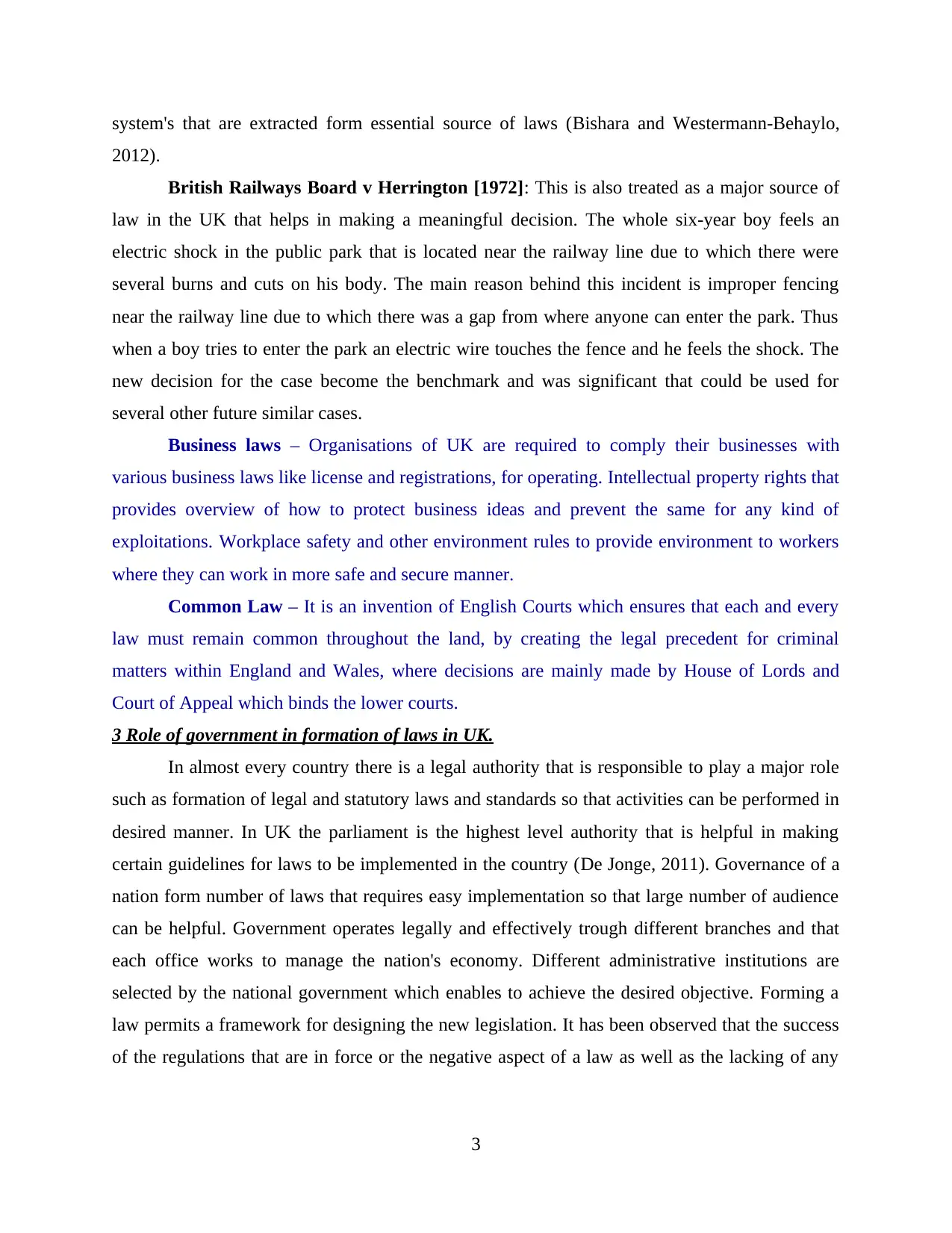
system's that are extracted form essential source of laws (Bishara and Westermann‐Behaylo,
2012).
British Railways Board v Herrington [1972]: This is also treated as a major source of
law in the UK that helps in making a meaningful decision. The whole six-year boy feels an
electric shock in the public park that is located near the railway line due to which there were
several burns and cuts on his body. The main reason behind this incident is improper fencing
near the railway line due to which there was a gap from where anyone can enter the park. Thus
when a boy tries to enter the park an electric wire touches the fence and he feels the shock. The
new decision for the case become the benchmark and was significant that could be used for
several other future similar cases.
Business laws – Organisations of UK are required to comply their businesses with
various business laws like license and registrations, for operating. Intellectual property rights that
provides overview of how to protect business ideas and prevent the same for any kind of
exploitations. Workplace safety and other environment rules to provide environment to workers
where they can work in more safe and secure manner.
Common Law – It is an invention of English Courts which ensures that each and every
law must remain common throughout the land, by creating the legal precedent for criminal
matters within England and Wales, where decisions are mainly made by House of Lords and
Court of Appeal which binds the lower courts.
3 Role of government in formation of laws in UK.
In almost every country there is a legal authority that is responsible to play a major role
such as formation of legal and statutory laws and standards so that activities can be performed in
desired manner. In UK the parliament is the highest level authority that is helpful in making
certain guidelines for laws to be implemented in the country (De Jonge, 2011). Governance of a
nation form number of laws that requires easy implementation so that large number of audience
can be helpful. Government operates legally and effectively trough different branches and that
each office works to manage the nation's economy. Different administrative institutions are
selected by the national government which enables to achieve the desired objective. Forming a
law permits a framework for designing the new legislation. It has been observed that the success
of the regulations that are in force or the negative aspect of a law as well as the lacking of any
3
2012).
British Railways Board v Herrington [1972]: This is also treated as a major source of
law in the UK that helps in making a meaningful decision. The whole six-year boy feels an
electric shock in the public park that is located near the railway line due to which there were
several burns and cuts on his body. The main reason behind this incident is improper fencing
near the railway line due to which there was a gap from where anyone can enter the park. Thus
when a boy tries to enter the park an electric wire touches the fence and he feels the shock. The
new decision for the case become the benchmark and was significant that could be used for
several other future similar cases.
Business laws – Organisations of UK are required to comply their businesses with
various business laws like license and registrations, for operating. Intellectual property rights that
provides overview of how to protect business ideas and prevent the same for any kind of
exploitations. Workplace safety and other environment rules to provide environment to workers
where they can work in more safe and secure manner.
Common Law – It is an invention of English Courts which ensures that each and every
law must remain common throughout the land, by creating the legal precedent for criminal
matters within England and Wales, where decisions are mainly made by House of Lords and
Court of Appeal which binds the lower courts.
3 Role of government in formation of laws in UK.
In almost every country there is a legal authority that is responsible to play a major role
such as formation of legal and statutory laws and standards so that activities can be performed in
desired manner. In UK the parliament is the highest level authority that is helpful in making
certain guidelines for laws to be implemented in the country (De Jonge, 2011). Governance of a
nation form number of laws that requires easy implementation so that large number of audience
can be helpful. Government operates legally and effectively trough different branches and that
each office works to manage the nation's economy. Different administrative institutions are
selected by the national government which enables to achieve the desired objective. Forming a
law permits a framework for designing the new legislation. It has been observed that the success
of the regulations that are in force or the negative aspect of a law as well as the lacking of any
3
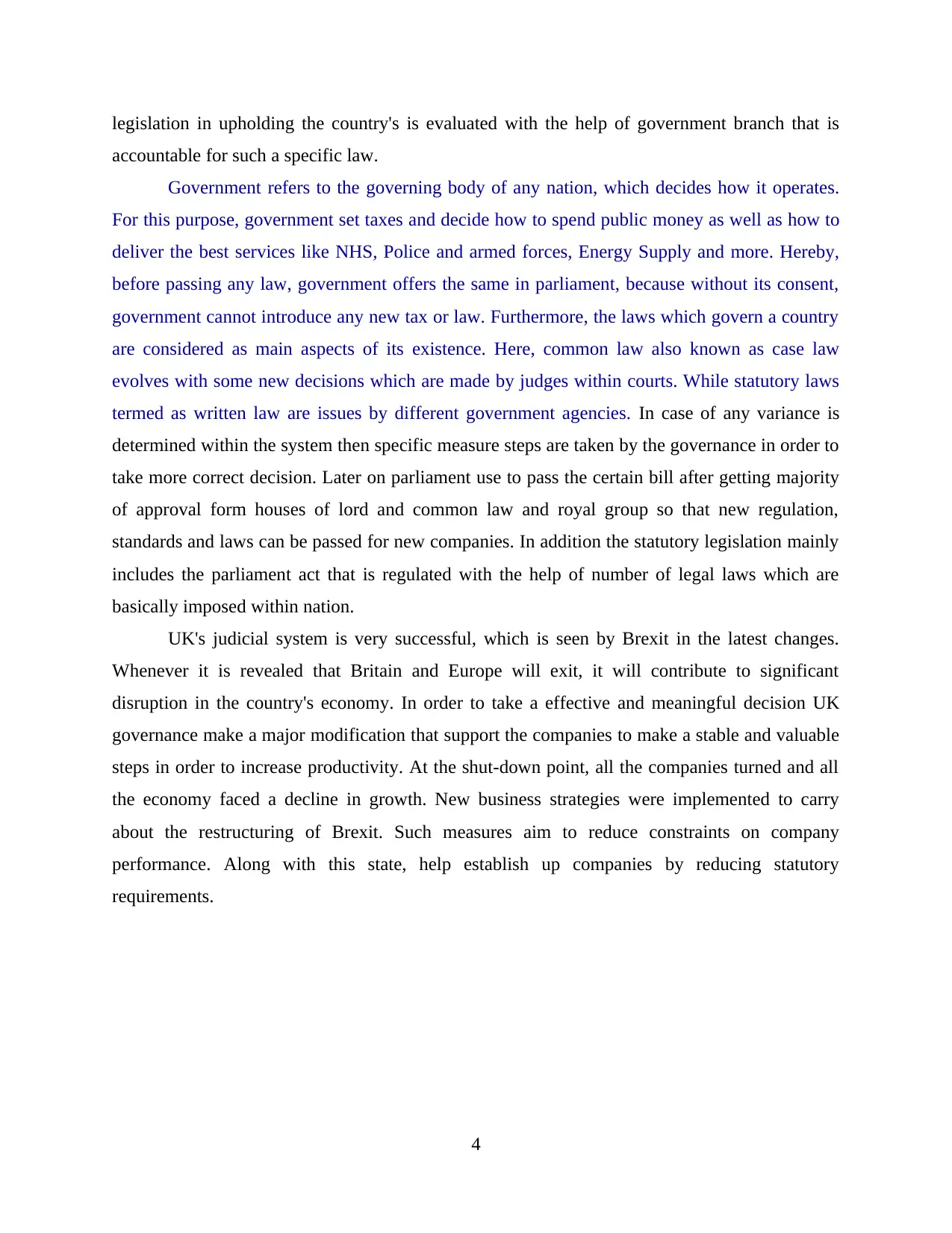
legislation in upholding the country's is evaluated with the help of government branch that is
accountable for such a specific law.
Government refers to the governing body of any nation, which decides how it operates.
For this purpose, government set taxes and decide how to spend public money as well as how to
deliver the best services like NHS, Police and armed forces, Energy Supply and more. Hereby,
before passing any law, government offers the same in parliament, because without its consent,
government cannot introduce any new tax or law. Furthermore, the laws which govern a country
are considered as main aspects of its existence. Here, common law also known as case law
evolves with some new decisions which are made by judges within courts. While statutory laws
termed as written law are issues by different government agencies. In case of any variance is
determined within the system then specific measure steps are taken by the governance in order to
take more correct decision. Later on parliament use to pass the certain bill after getting majority
of approval form houses of lord and common law and royal group so that new regulation,
standards and laws can be passed for new companies. In addition the statutory legislation mainly
includes the parliament act that is regulated with the help of number of legal laws which are
basically imposed within nation.
UK's judicial system is very successful, which is seen by Brexit in the latest changes.
Whenever it is revealed that Britain and Europe will exit, it will contribute to significant
disruption in the country's economy. In order to take a effective and meaningful decision UK
governance make a major modification that support the companies to make a stable and valuable
steps in order to increase productivity. At the shut-down point, all the companies turned and all
the economy faced a decline in growth. New business strategies were implemented to carry
about the restructuring of Brexit. Such measures aim to reduce constraints on company
performance. Along with this state, help establish up companies by reducing statutory
requirements.
4
accountable for such a specific law.
Government refers to the governing body of any nation, which decides how it operates.
For this purpose, government set taxes and decide how to spend public money as well as how to
deliver the best services like NHS, Police and armed forces, Energy Supply and more. Hereby,
before passing any law, government offers the same in parliament, because without its consent,
government cannot introduce any new tax or law. Furthermore, the laws which govern a country
are considered as main aspects of its existence. Here, common law also known as case law
evolves with some new decisions which are made by judges within courts. While statutory laws
termed as written law are issues by different government agencies. In case of any variance is
determined within the system then specific measure steps are taken by the governance in order to
take more correct decision. Later on parliament use to pass the certain bill after getting majority
of approval form houses of lord and common law and royal group so that new regulation,
standards and laws can be passed for new companies. In addition the statutory legislation mainly
includes the parliament act that is regulated with the help of number of legal laws which are
basically imposed within nation.
UK's judicial system is very successful, which is seen by Brexit in the latest changes.
Whenever it is revealed that Britain and Europe will exit, it will contribute to significant
disruption in the country's economy. In order to take a effective and meaningful decision UK
governance make a major modification that support the companies to make a stable and valuable
steps in order to increase productivity. At the shut-down point, all the companies turned and all
the economy faced a decline in growth. New business strategies were implemented to carry
about the restructuring of Brexit. Such measures aim to reduce constraints on company
performance. Along with this state, help establish up companies by reducing statutory
requirements.
4
⊘ This is a preview!⊘
Do you want full access?
Subscribe today to unlock all pages.

Trusted by 1+ million students worldwide
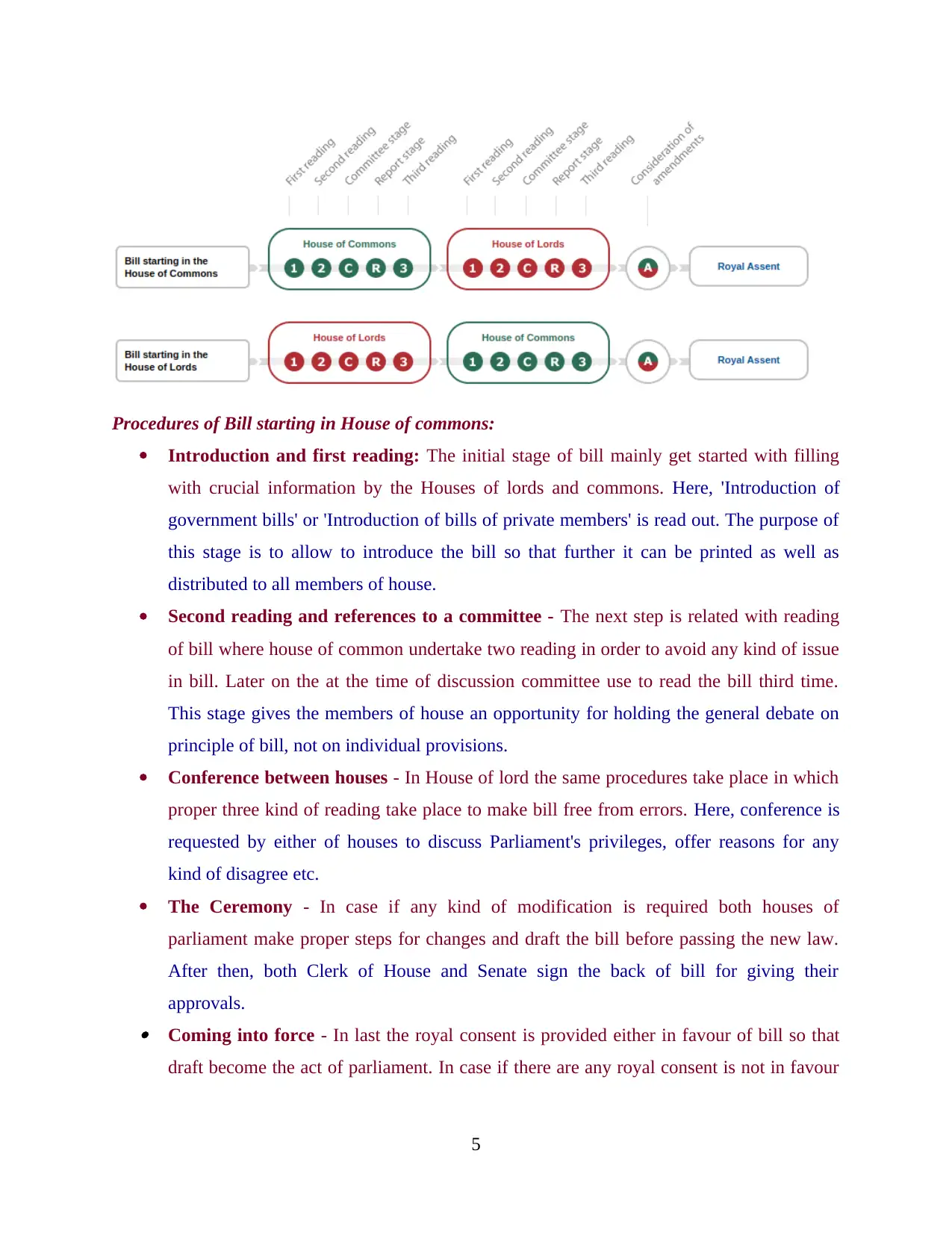
Procedures of Bill starting in House of commons:
Introduction and first reading: The initial stage of bill mainly get started with filling
with crucial information by the Houses of lords and commons. Here, 'Introduction of
government bills' or 'Introduction of bills of private members' is read out. The purpose of
this stage is to allow to introduce the bill so that further it can be printed as well as
distributed to all members of house.
Second reading and references to a committee - The next step is related with reading
of bill where house of common undertake two reading in order to avoid any kind of issue
in bill. Later on the at the time of discussion committee use to read the bill third time.
This stage gives the members of house an opportunity for holding the general debate on
principle of bill, not on individual provisions.
Conference between houses - In House of lord the same procedures take place in which
proper three kind of reading take place to make bill free from errors. Here, conference is
requested by either of houses to discuss Parliament's privileges, offer reasons for any
kind of disagree etc.
The Ceremony - In case if any kind of modification is required both houses of
parliament make proper steps for changes and draft the bill before passing the new law.
After then, both Clerk of House and Senate sign the back of bill for giving their
approvals. Coming into force - In last the royal consent is provided either in favour of bill so that
draft become the act of parliament. In case if there are any royal consent is not in favour
5
Introduction and first reading: The initial stage of bill mainly get started with filling
with crucial information by the Houses of lords and commons. Here, 'Introduction of
government bills' or 'Introduction of bills of private members' is read out. The purpose of
this stage is to allow to introduce the bill so that further it can be printed as well as
distributed to all members of house.
Second reading and references to a committee - The next step is related with reading
of bill where house of common undertake two reading in order to avoid any kind of issue
in bill. Later on the at the time of discussion committee use to read the bill third time.
This stage gives the members of house an opportunity for holding the general debate on
principle of bill, not on individual provisions.
Conference between houses - In House of lord the same procedures take place in which
proper three kind of reading take place to make bill free from errors. Here, conference is
requested by either of houses to discuss Parliament's privileges, offer reasons for any
kind of disagree etc.
The Ceremony - In case if any kind of modification is required both houses of
parliament make proper steps for changes and draft the bill before passing the new law.
After then, both Clerk of House and Senate sign the back of bill for giving their
approvals. Coming into force - In last the royal consent is provided either in favour of bill so that
draft become the act of parliament. In case if there are any royal consent is not in favour
5
Paraphrase This Document
Need a fresh take? Get an instant paraphrase of this document with our AI Paraphraser
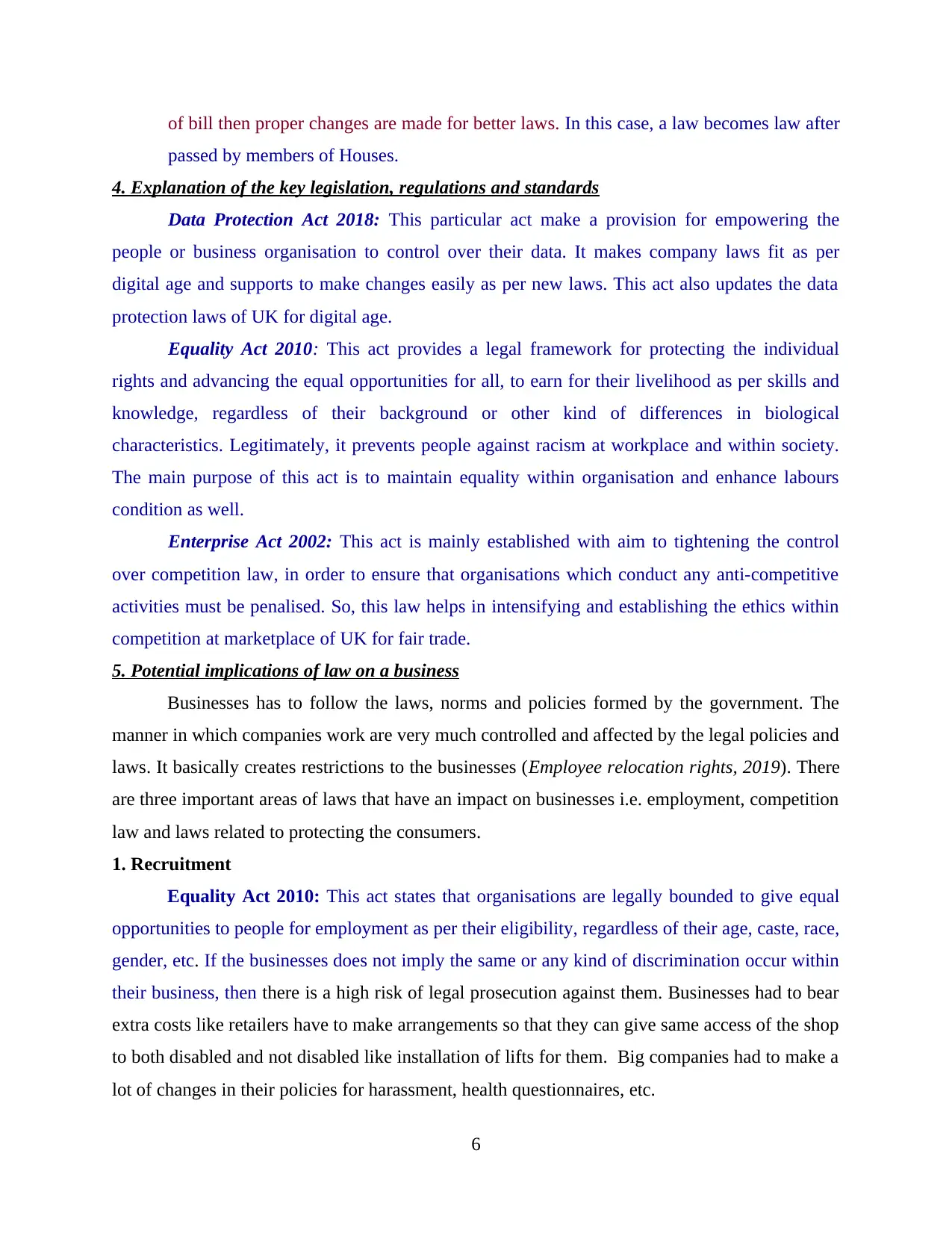
of bill then proper changes are made for better laws. In this case, a law becomes law after
passed by members of Houses.
4. Explanation of the key legislation, regulations and standards
Data Protection Act 2018: This particular act make a provision for empowering the
people or business organisation to control over their data. It makes company laws fit as per
digital age and supports to make changes easily as per new laws. This act also updates the data
protection laws of UK for digital age.
Equality Act 2010: This act provides a legal framework for protecting the individual
rights and advancing the equal opportunities for all, to earn for their livelihood as per skills and
knowledge, regardless of their background or other kind of differences in biological
characteristics. Legitimately, it prevents people against racism at workplace and within society.
The main purpose of this act is to maintain equality within organisation and enhance labours
condition as well.
Enterprise Act 2002: This act is mainly established with aim to tightening the control
over competition law, in order to ensure that organisations which conduct any anti-competitive
activities must be penalised. So, this law helps in intensifying and establishing the ethics within
competition at marketplace of UK for fair trade.
5. Potential implications of law on a business
Businesses has to follow the laws, norms and policies formed by the government. The
manner in which companies work are very much controlled and affected by the legal policies and
laws. It basically creates restrictions to the businesses (Employee relocation rights, 2019). There
are three important areas of laws that have an impact on businesses i.e. employment, competition
law and laws related to protecting the consumers.
1. Recruitment
Equality Act 2010: This act states that organisations are legally bounded to give equal
opportunities to people for employment as per their eligibility, regardless of their age, caste, race,
gender, etc. If the businesses does not imply the same or any kind of discrimination occur within
their business, then there is a high risk of legal prosecution against them. Businesses had to bear
extra costs like retailers have to make arrangements so that they can give same access of the shop
to both disabled and not disabled like installation of lifts for them. Big companies had to make a
lot of changes in their policies for harassment, health questionnaires, etc.
6
passed by members of Houses.
4. Explanation of the key legislation, regulations and standards
Data Protection Act 2018: This particular act make a provision for empowering the
people or business organisation to control over their data. It makes company laws fit as per
digital age and supports to make changes easily as per new laws. This act also updates the data
protection laws of UK for digital age.
Equality Act 2010: This act provides a legal framework for protecting the individual
rights and advancing the equal opportunities for all, to earn for their livelihood as per skills and
knowledge, regardless of their background or other kind of differences in biological
characteristics. Legitimately, it prevents people against racism at workplace and within society.
The main purpose of this act is to maintain equality within organisation and enhance labours
condition as well.
Enterprise Act 2002: This act is mainly established with aim to tightening the control
over competition law, in order to ensure that organisations which conduct any anti-competitive
activities must be penalised. So, this law helps in intensifying and establishing the ethics within
competition at marketplace of UK for fair trade.
5. Potential implications of law on a business
Businesses has to follow the laws, norms and policies formed by the government. The
manner in which companies work are very much controlled and affected by the legal policies and
laws. It basically creates restrictions to the businesses (Employee relocation rights, 2019). There
are three important areas of laws that have an impact on businesses i.e. employment, competition
law and laws related to protecting the consumers.
1. Recruitment
Equality Act 2010: This act states that organisations are legally bounded to give equal
opportunities to people for employment as per their eligibility, regardless of their age, caste, race,
gender, etc. If the businesses does not imply the same or any kind of discrimination occur within
their business, then there is a high risk of legal prosecution against them. Businesses had to bear
extra costs like retailers have to make arrangements so that they can give same access of the shop
to both disabled and not disabled like installation of lifts for them. Big companies had to make a
lot of changes in their policies for harassment, health questionnaires, etc.
6
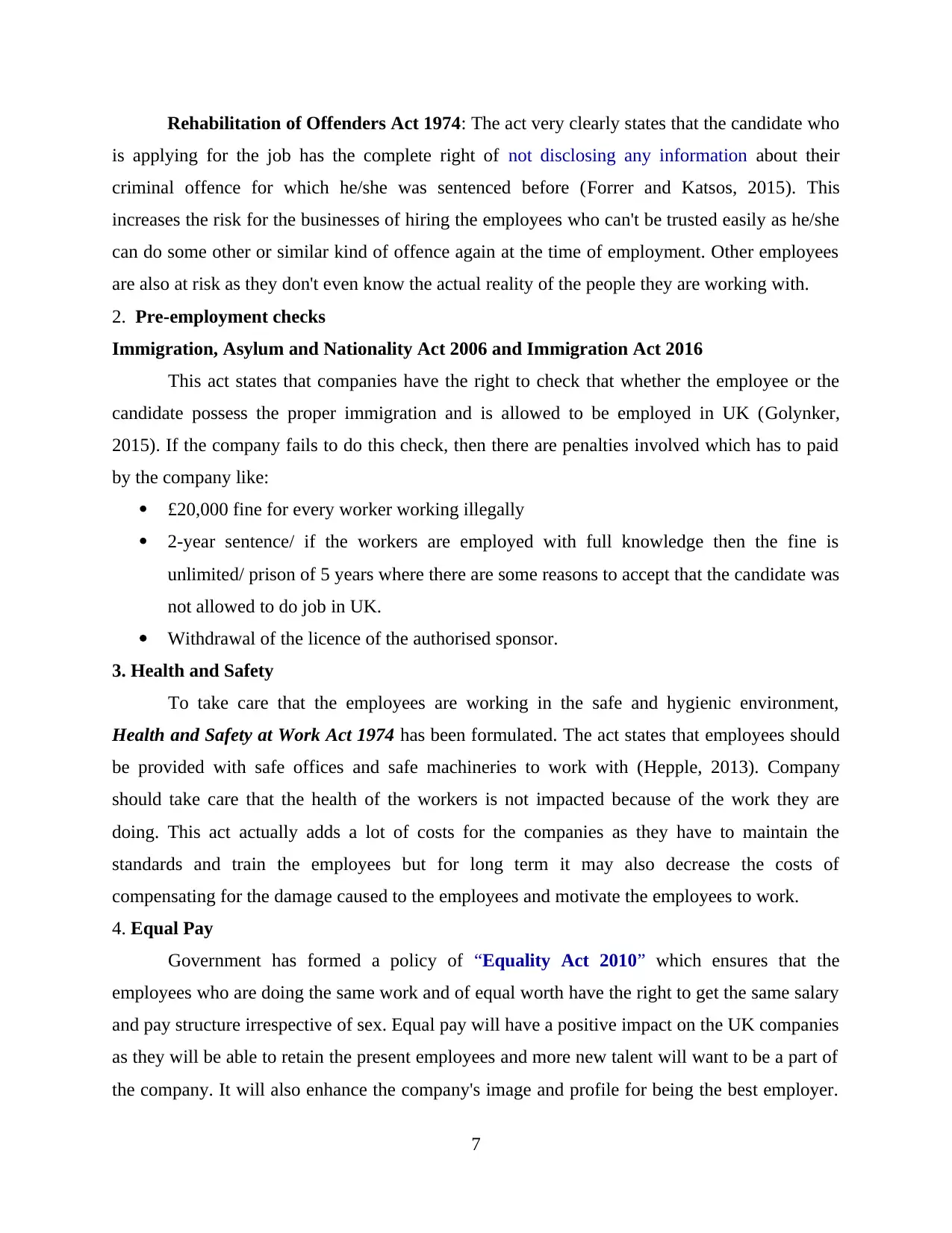
Rehabilitation of Offenders Act 1974: The act very clearly states that the candidate who
is applying for the job has the complete right of not disclosing any information about their
criminal offence for which he/she was sentenced before (Forrer and Katsos, 2015). This
increases the risk for the businesses of hiring the employees who can't be trusted easily as he/she
can do some other or similar kind of offence again at the time of employment. Other employees
are also at risk as they don't even know the actual reality of the people they are working with.
2. Pre-employment checks
Immigration, Asylum and Nationality Act 2006 and Immigration Act 2016
This act states that companies have the right to check that whether the employee or the
candidate possess the proper immigration and is allowed to be employed in UK (Golynker,
2015). If the company fails to do this check, then there are penalties involved which has to paid
by the company like:
£20,000 fine for every worker working illegally
2-year sentence/ if the workers are employed with full knowledge then the fine is
unlimited/ prison of 5 years where there are some reasons to accept that the candidate was
not allowed to do job in UK.
Withdrawal of the licence of the authorised sponsor.
3. Health and Safety
To take care that the employees are working in the safe and hygienic environment,
Health and Safety at Work Act 1974 has been formulated. The act states that employees should
be provided with safe offices and safe machineries to work with (Hepple, 2013). Company
should take care that the health of the workers is not impacted because of the work they are
doing. This act actually adds a lot of costs for the companies as they have to maintain the
standards and train the employees but for long term it may also decrease the costs of
compensating for the damage caused to the employees and motivate the employees to work.
4. Equal Pay
Government has formed a policy of “Equality Act 2010” which ensures that the
employees who are doing the same work and of equal worth have the right to get the same salary
and pay structure irrespective of sex. Equal pay will have a positive impact on the UK companies
as they will be able to retain the present employees and more new talent will want to be a part of
the company. It will also enhance the company's image and profile for being the best employer.
7
is applying for the job has the complete right of not disclosing any information about their
criminal offence for which he/she was sentenced before (Forrer and Katsos, 2015). This
increases the risk for the businesses of hiring the employees who can't be trusted easily as he/she
can do some other or similar kind of offence again at the time of employment. Other employees
are also at risk as they don't even know the actual reality of the people they are working with.
2. Pre-employment checks
Immigration, Asylum and Nationality Act 2006 and Immigration Act 2016
This act states that companies have the right to check that whether the employee or the
candidate possess the proper immigration and is allowed to be employed in UK (Golynker,
2015). If the company fails to do this check, then there are penalties involved which has to paid
by the company like:
£20,000 fine for every worker working illegally
2-year sentence/ if the workers are employed with full knowledge then the fine is
unlimited/ prison of 5 years where there are some reasons to accept that the candidate was
not allowed to do job in UK.
Withdrawal of the licence of the authorised sponsor.
3. Health and Safety
To take care that the employees are working in the safe and hygienic environment,
Health and Safety at Work Act 1974 has been formulated. The act states that employees should
be provided with safe offices and safe machineries to work with (Hepple, 2013). Company
should take care that the health of the workers is not impacted because of the work they are
doing. This act actually adds a lot of costs for the companies as they have to maintain the
standards and train the employees but for long term it may also decrease the costs of
compensating for the damage caused to the employees and motivate the employees to work.
4. Equal Pay
Government has formed a policy of “Equality Act 2010” which ensures that the
employees who are doing the same work and of equal worth have the right to get the same salary
and pay structure irrespective of sex. Equal pay will have a positive impact on the UK companies
as they will be able to retain the present employees and more new talent will want to be a part of
the company. It will also enhance the company's image and profile for being the best employer.
7
⊘ This is a preview!⊘
Do you want full access?
Subscribe today to unlock all pages.

Trusted by 1+ million students worldwide
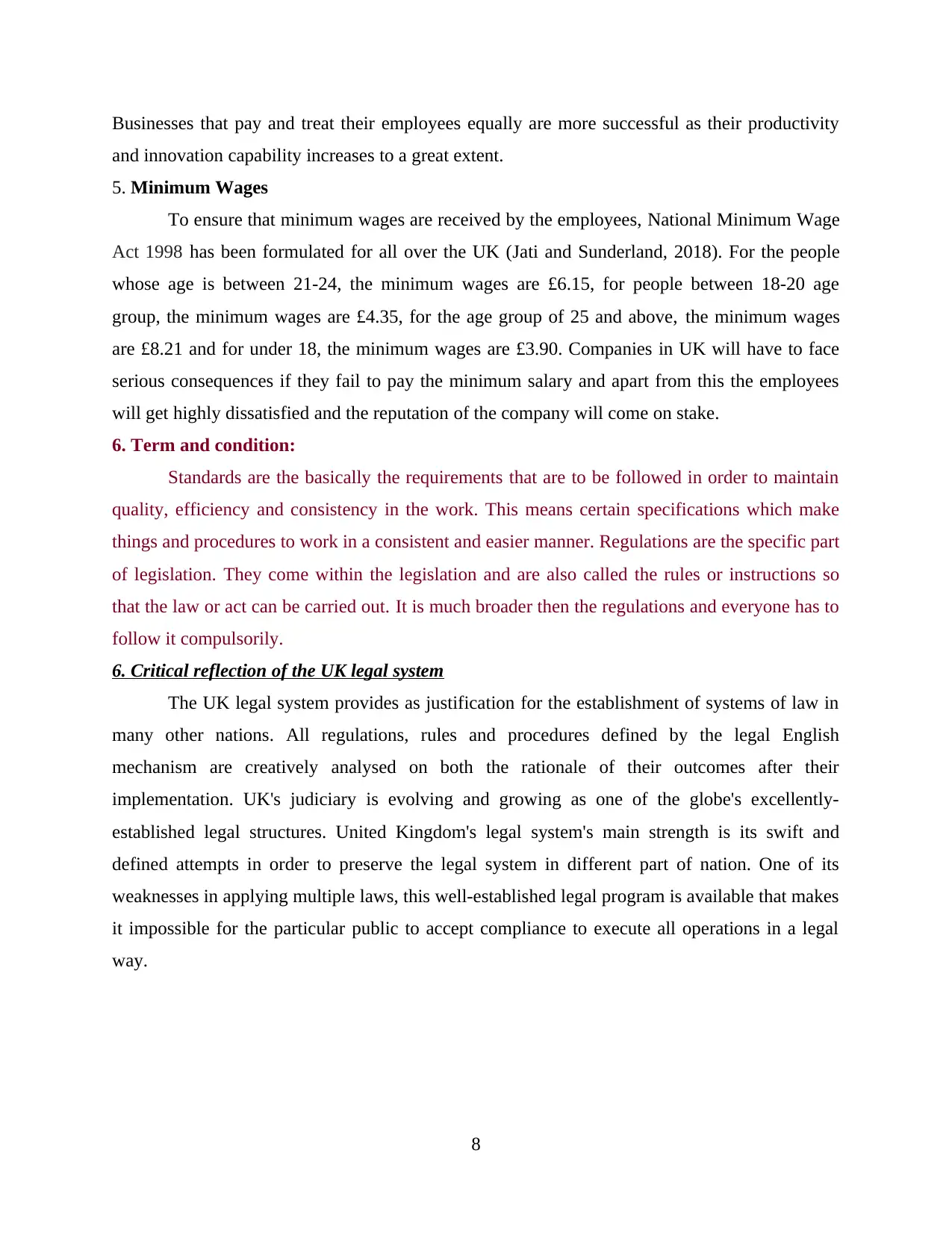
Businesses that pay and treat their employees equally are more successful as their productivity
and innovation capability increases to a great extent.
5. Minimum Wages
To ensure that minimum wages are received by the employees, National Minimum Wage
Act 1998 has been formulated for all over the UK (Jati and Sunderland, 2018). For the people
whose age is between 21-24, the minimum wages are £6.15, for people between 18-20 age
group, the minimum wages are £4.35, for the age group of 25 and above, the minimum wages
are £8.21 and for under 18, the minimum wages are £3.90. Companies in UK will have to face
serious consequences if they fail to pay the minimum salary and apart from this the employees
will get highly dissatisfied and the reputation of the company will come on stake.
6. Term and condition:
Standards are the basically the requirements that are to be followed in order to maintain
quality, efficiency and consistency in the work. This means certain specifications which make
things and procedures to work in a consistent and easier manner. Regulations are the specific part
of legislation. They come within the legislation and are also called the rules or instructions so
that the law or act can be carried out. It is much broader then the regulations and everyone has to
follow it compulsorily.
6. Critical reflection of the UK legal system
The UK legal system provides as justification for the establishment of systems of law in
many other nations. All regulations, rules and procedures defined by the legal English
mechanism are creatively analysed on both the rationale of their outcomes after their
implementation. UK's judiciary is evolving and growing as one of the globe's excellently-
established legal structures. United Kingdom's legal system's main strength is its swift and
defined attempts in order to preserve the legal system in different part of nation. One of its
weaknesses in applying multiple laws, this well-established legal program is available that makes
it impossible for the particular public to accept compliance to execute all operations in a legal
way.
8
and innovation capability increases to a great extent.
5. Minimum Wages
To ensure that minimum wages are received by the employees, National Minimum Wage
Act 1998 has been formulated for all over the UK (Jati and Sunderland, 2018). For the people
whose age is between 21-24, the minimum wages are £6.15, for people between 18-20 age
group, the minimum wages are £4.35, for the age group of 25 and above, the minimum wages
are £8.21 and for under 18, the minimum wages are £3.90. Companies in UK will have to face
serious consequences if they fail to pay the minimum salary and apart from this the employees
will get highly dissatisfied and the reputation of the company will come on stake.
6. Term and condition:
Standards are the basically the requirements that are to be followed in order to maintain
quality, efficiency and consistency in the work. This means certain specifications which make
things and procedures to work in a consistent and easier manner. Regulations are the specific part
of legislation. They come within the legislation and are also called the rules or instructions so
that the law or act can be carried out. It is much broader then the regulations and everyone has to
follow it compulsorily.
6. Critical reflection of the UK legal system
The UK legal system provides as justification for the establishment of systems of law in
many other nations. All regulations, rules and procedures defined by the legal English
mechanism are creatively analysed on both the rationale of their outcomes after their
implementation. UK's judiciary is evolving and growing as one of the globe's excellently-
established legal structures. United Kingdom's legal system's main strength is its swift and
defined attempts in order to preserve the legal system in different part of nation. One of its
weaknesses in applying multiple laws, this well-established legal program is available that makes
it impossible for the particular public to accept compliance to execute all operations in a legal
way.
8
Paraphrase This Document
Need a fresh take? Get an instant paraphrase of this document with our AI Paraphraser
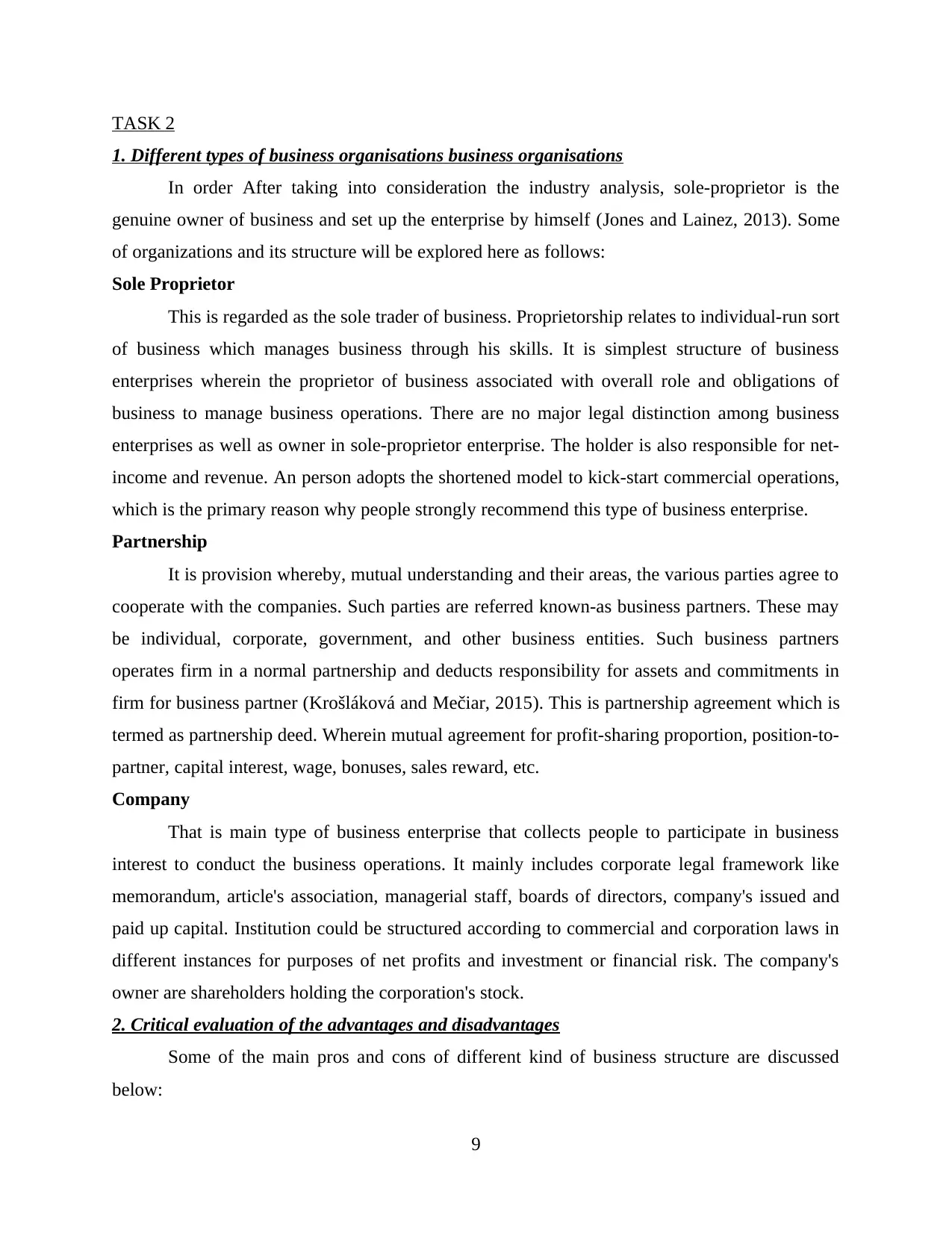
TASK 2
1. Different types of business organisations business organisations
In order After taking into consideration the industry analysis, sole-proprietor is the
genuine owner of business and set up the enterprise by himself (Jones and Lainez, 2013). Some
of organizations and its structure will be explored here as follows:
Sole Proprietor
This is regarded as the sole trader of business. Proprietorship relates to individual-run sort
of business which manages business through his skills. It is simplest structure of business
enterprises wherein the proprietor of business associated with overall role and obligations of
business to manage business operations. There are no major legal distinction among business
enterprises as well as owner in sole-proprietor enterprise. The holder is also responsible for net-
income and revenue. An person adopts the shortened model to kick-start commercial operations,
which is the primary reason why people strongly recommend this type of business enterprise.
Partnership
It is provision whereby, mutual understanding and their areas, the various parties agree to
cooperate with the companies. Such parties are referred known-as business partners. These may
be individual, corporate, government, and other business entities. Such business partners
operates firm in a normal partnership and deducts responsibility for assets and commitments in
firm for business partner (Krošláková and Mečiar, 2015). This is partnership agreement which is
termed as partnership deed. Wherein mutual agreement for profit-sharing proportion, position-to-
partner, capital interest, wage, bonuses, sales reward, etc.
Company
That is main type of business enterprise that collects people to participate in business
interest to conduct the business operations. It mainly includes corporate legal framework like
memorandum, article's association, managerial staff, boards of directors, company's issued and
paid up capital. Institution could be structured according to commercial and corporation laws in
different instances for purposes of net profits and investment or financial risk. The company's
owner are shareholders holding the corporation's stock.
2. Critical evaluation of the advantages and disadvantages
Some of the main pros and cons of different kind of business structure are discussed
below:
9
1. Different types of business organisations business organisations
In order After taking into consideration the industry analysis, sole-proprietor is the
genuine owner of business and set up the enterprise by himself (Jones and Lainez, 2013). Some
of organizations and its structure will be explored here as follows:
Sole Proprietor
This is regarded as the sole trader of business. Proprietorship relates to individual-run sort
of business which manages business through his skills. It is simplest structure of business
enterprises wherein the proprietor of business associated with overall role and obligations of
business to manage business operations. There are no major legal distinction among business
enterprises as well as owner in sole-proprietor enterprise. The holder is also responsible for net-
income and revenue. An person adopts the shortened model to kick-start commercial operations,
which is the primary reason why people strongly recommend this type of business enterprise.
Partnership
It is provision whereby, mutual understanding and their areas, the various parties agree to
cooperate with the companies. Such parties are referred known-as business partners. These may
be individual, corporate, government, and other business entities. Such business partners
operates firm in a normal partnership and deducts responsibility for assets and commitments in
firm for business partner (Krošláková and Mečiar, 2015). This is partnership agreement which is
termed as partnership deed. Wherein mutual agreement for profit-sharing proportion, position-to-
partner, capital interest, wage, bonuses, sales reward, etc.
Company
That is main type of business enterprise that collects people to participate in business
interest to conduct the business operations. It mainly includes corporate legal framework like
memorandum, article's association, managerial staff, boards of directors, company's issued and
paid up capital. Institution could be structured according to commercial and corporation laws in
different instances for purposes of net profits and investment or financial risk. The company's
owner are shareholders holding the corporation's stock.
2. Critical evaluation of the advantages and disadvantages
Some of the main pros and cons of different kind of business structure are discussed
below:
9
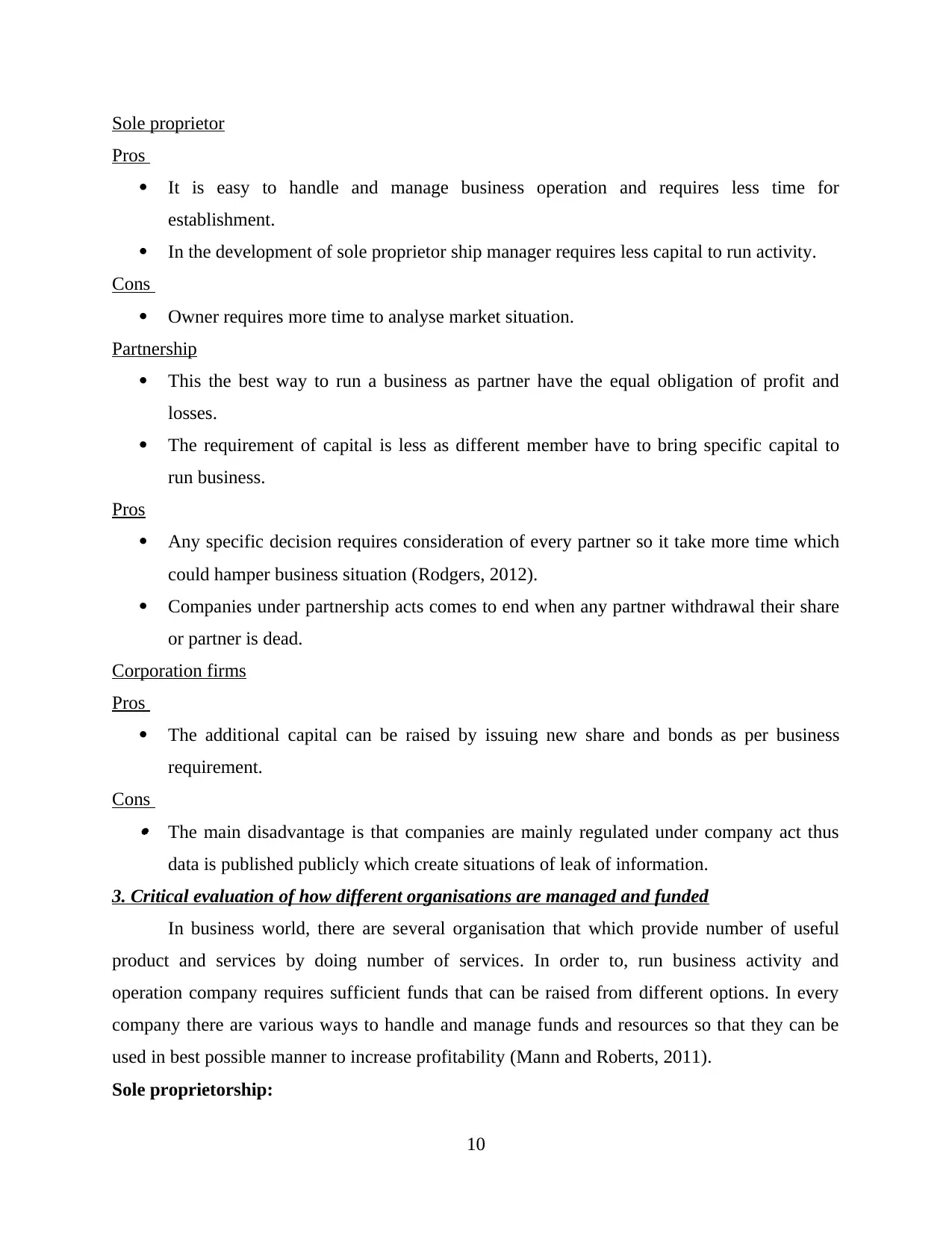
Sole proprietor
Pros
It is easy to handle and manage business operation and requires less time for
establishment.
In the development of sole proprietor ship manager requires less capital to run activity.
Cons
Owner requires more time to analyse market situation.
Partnership
This the best way to run a business as partner have the equal obligation of profit and
losses.
The requirement of capital is less as different member have to bring specific capital to
run business.
Pros
Any specific decision requires consideration of every partner so it take more time which
could hamper business situation (Rodgers, 2012).
Companies under partnership acts comes to end when any partner withdrawal their share
or partner is dead.
Corporation firms
Pros
The additional capital can be raised by issuing new share and bonds as per business
requirement.
Cons The main disadvantage is that companies are mainly regulated under company act thus
data is published publicly which create situations of leak of information.
3. Critical evaluation of how different organisations are managed and funded
In business world, there are several organisation that which provide number of useful
product and services by doing number of services. In order to, run business activity and
operation company requires sufficient funds that can be raised from different options. In every
company there are various ways to handle and manage funds and resources so that they can be
used in best possible manner to increase profitability (Mann and Roberts, 2011).
Sole proprietorship:
10
Pros
It is easy to handle and manage business operation and requires less time for
establishment.
In the development of sole proprietor ship manager requires less capital to run activity.
Cons
Owner requires more time to analyse market situation.
Partnership
This the best way to run a business as partner have the equal obligation of profit and
losses.
The requirement of capital is less as different member have to bring specific capital to
run business.
Pros
Any specific decision requires consideration of every partner so it take more time which
could hamper business situation (Rodgers, 2012).
Companies under partnership acts comes to end when any partner withdrawal their share
or partner is dead.
Corporation firms
Pros
The additional capital can be raised by issuing new share and bonds as per business
requirement.
Cons The main disadvantage is that companies are mainly regulated under company act thus
data is published publicly which create situations of leak of information.
3. Critical evaluation of how different organisations are managed and funded
In business world, there are several organisation that which provide number of useful
product and services by doing number of services. In order to, run business activity and
operation company requires sufficient funds that can be raised from different options. In every
company there are various ways to handle and manage funds and resources so that they can be
used in best possible manner to increase profitability (Mann and Roberts, 2011).
Sole proprietorship:
10
⊘ This is a preview!⊘
Do you want full access?
Subscribe today to unlock all pages.

Trusted by 1+ million students worldwide
1 out of 17
Related Documents
Your All-in-One AI-Powered Toolkit for Academic Success.
+13062052269
info@desklib.com
Available 24*7 on WhatsApp / Email
![[object Object]](/_next/static/media/star-bottom.7253800d.svg)
Unlock your academic potential
Copyright © 2020–2026 A2Z Services. All Rights Reserved. Developed and managed by ZUCOL.





